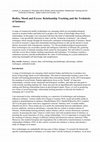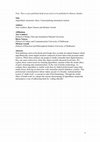Papers by Alex Lambert
Australian Journal of Telecommunications and the Digital Economy, 2014
Qualitative Inquiry
Research into intimacy must grapple with its ambiguity while attempting to place it within a cont... more Research into intimacy must grapple with its ambiguity while attempting to place it within a contemporary technological and political context. I argue for a metaphysics of intimacy that provides a ground for research. Through a critical reading of the philosophy of Peter Sloterdijk, I suggest a formal dialectic between intimacy and cosmopolitanism. Intimacy is an enclosure over time, while cosmopolitanism is an opening through an event. These ideal forms become actual in digital media, which often reveal the dark side of intimacy, as they withhold the cosmopolitan event and hence the possibility of diverse yet cohesive collectives. I outline various fields of research where the contradiction between intimacy and cosmopolitanism can be explored and potentially resolved through methodologies that critically imagine alternative designs.

A range of commercial mobile technologies are emerging which use psychophysiological sensors to m... more A range of commercial mobile technologies are emerging which use psychophysiological sensors to monitor bodies and behaviour to produce new forms of knowledge about social relationships. In this paper I am concerned with how this kind of relationship tracking influences intimacy. I am specifically interested in what I call the " technicity of intimacy " , the cultural techniques which emerge through the historically contingent technologisation of intimacy. Based on archival research, I argue that relationship tracking promises to take up the intensive social labours associated with contemporary intimacy. Yet, the psychophysiological measurements these technologies rely on produce partial and ambiguous indicators of intimate life, gesturing toward an excess of intimate meaning which cannot be interrogated. The self-reflexive concern with this excess drives further tracking experiments and techniques. Yet intimacy remains a continuous mystery, and this problematises the value of self-tracking as a system dedicated to achieving meaningful self-knowledge and completeness.

Concepts, Methodologies, Tools, and Applications, 2015
Networked media are increasingly pervading public spaces and influencing the way we behave in pub... more Networked media are increasingly pervading public spaces and influencing the way we behave in public. Australian municipalities and cultural institutions have begun deploying free Wi-Fi services hoping they will attract more visitors to public places, aid in curated events, galvanise communities and enhance local economies. In this article we present multi-method research aimed at understanding whether such services can enhance public space and culture, and hence contribute to the public good. We identify multiple forms of positive use which certain kinds of services enable. However, many public institutions face problems to do with funding, network models and choice of place which prevent the actualisation of these positive outcomes. We consider how e-planning can be mobilised to help such institutions develop virtuous networked public spaces.

In this paper I bring together inter-disciplinary concerns from emergency management, crisis info... more In this paper I bring together inter-disciplinary concerns from emergency management, crisis informatics and media studies to offer five critical perspectives on social media in disaster response and recovery. I argue social media become part of ‘disaster data assemblages’ that have heterogeneous economic, political, institutional and technological properties. These assemblages emerge from time-critical situation awareness procedures and through the help of volunteer technical communities. They have import for big data knowledge and data ethics, and continue to influence disaster recoveries in subtle ways. However, epistemological problems arise when relating the response and recovery phases of a disaster data assemblage. I considering new ways to think about social and mobile media in recovery that go beyond both the language of data, and the currently popular focus on ‘communities of practice’.

Social capital has become a key concept in the study of social network sites such as Facebook. An... more Social capital has become a key concept in the study of social network sites such as Facebook. An influential body of literature has emerged which links the accumulation of social capital on Facebook to various psychological traits and depositions. There is a need to augment this work with a more critical, qualitative approach which recognises other key social and technological aspects of Facebook. Based on ethnographic research, I explore how the exchange of social capital on Facebook is significantly influenced by mobility, surveillance and norms of public intimacy. Facebook users must continually negotiate intimacy when claiming on social capital, and this involves a nascent set of social skills and digital literacies. I suggest the term ‘intimacy capital’ to conceptualise the way in which these skills are distributed unevenly in society, opening up a critical way of thinking about social capital and intimacy on Facebook.

Public Wi-Fi services are rolling out across Australia, with city councils and telcos building la... more Public Wi-Fi services are rolling out across Australia, with city councils and telcos building large-scale networks in urban areas. Questions as to the value of public Wi-Fi have never been more significant in the Australian context. In this article we explore how free Wi-Fi services offered by cultural institutions and municipalities influence public spaces, and ask how such services can engender practices which articulate the social good. Drawing on ethnographic research into six Wi-Fi equipped spaces in Victoria, we find a variety of issues which influence whether a service will be popular and hence have a significant influence on public space. Services which are popular enable a range of uses, and this can add to the appeal and atmosphere of a space. However, Wi-Fi has yet to truly facilitate the kind of social interactions and rich civic placemaking we associate with the social good.
Networked media are increasingly pervading public spaces and influencing the way we behave in pub... more Networked media are increasingly pervading public spaces and influencing the way we behave in public. Australian municipalities and cultural institutions have begun deploying free Wi-Fi services hoping they will attract more visitors to public places, aid in curated events, galvanise communities and enhance local economies. In this article we present multi-method research aimed at understanding whether such services can enhance public space and culture, and hence contribute to the public good. We identify multiple forms of positive use which certain kinds of services enable. However, many public institutions face problems to do with funding, network models and choice of place which prevent the actualisation of these positive outcomes. We consider how e-planning can be mobilised to help such institutions develop virtuous networked public spaces.
Books by Alex Lambert
Book chapter by Alex Lambert
Conference Proceedings (edited) by Alex Lambert

Blurb: The Internet in its present form has undergone a number of ‘conceptual evolutions,’ yet at... more Blurb: The Internet in its present form has undergone a number of ‘conceptual evolutions,’ yet at its base it remains an open network of computers programmed to exchange packages of data. In the 1960s Cold War hysteria prompted the United States to create a decentralized network capable of withstanding a nuclear strike. By the 1990s the Internet had developed into a world wide web for mainstream use. While inventors saw the technological potential of the network, it has been the ideological enthusiasm of developers that has propelled the Internet through the last two decades with the promise of its utopian applications. We are now living amongst a certain cynicism of commentators on the scope and application of Internet culture that marks a regression of the hype surrounding online potentialities.
Unintended Consequences aims to discuss to what degree it is necessary for us to rethink our current ideological and practical conceptions of the Internet. Its speakers will address and explore issues surrounding the following:
- From both a capitalist and counter-cultural perspective, did the Internet develop in the 1990s into, what Georges Sorel would call ‘social myth,’ an inspiring fiction?
- If so, how have our aspirational visualisations of the Internet developed since the 1990s (e.g. as a democratizing space, as the free market in its purest form)?
- Are the Western values of freedom and the individual that underpin our expectations of the Internet being subverted by its unregulated nature?
- Is there a common ‘intentionality’ to the Internet and if so, how can we mitigate against the various ‘unintended consequences’?
- Are good intentions ‘good enough’ to explore the limits of ‘hive mind’ and ‘crowd-sourcing’ projects? Or will these concepts come into their own through more corrupt means?
- Are we witnessing the establishment of a global social brain?
- In what sense is ‘truth’ and ‘reality’ becoming endorsed (or not) as relative concepts online (e.g. through ‘play,’ social media profiling, collaborative editing - Wikipedia)?
- Is social networking introducing a new paradigm for morality in our everyday lives?
- What exactly are we sharing when we ‘share’ online? To what extent do we affirm or concede parts of our own identity in discursive practices on social media platforms?
- To what extent is intrusive, Internet surveillance tolerated by the general public who wish to benefit from combined online connectivity and locality to ‘personalize’ place?
Presenters:
Marcus Breen of Bond University exposes the social myth of ‘web 2.0 society’ by confronting us with two dystopian aspects of Internet culture: pornography and jihadism. Breen argues that transgressive knowledge circulates freely through the individual’s private engagement with Internet via the computer monitor, thereby dissolving the previous collective nature of media consumption and its societal principles.
Artist, games researcher and media scholar at La Trobe University, Hugh Davies is the creator of the Alternate Reality game, The Darkest Puzzle, a game that explores the ethical limits of serious gamification. Inspired by the events of 9/11, The Darkest Puzzle leads gamers through a labyrinth of evidence, conspiracies and game meta discussion. Davies offers a critical approach the “hive mind” and popular phenomena, such as “crowd-sourcing”.
Scott McQuire, media scholar and urban theorist at the University of Melbourne, focuses on the permeating impact of networks on situated and material spaces of the urban everyday. McQuire addresses the ambivalent nature of pervasive networks in terms of the spontaneity and serendipity so important to the modern city, as well as their utilization as intensive integrated surveillance.
Alex Lambert probes aspects of the mediated gaze and intimacy on Facebook through his research into social media at Melbourne University. Many have identified the voyeuristic enticements of Facebook publicity, though this is only part of the story. Lambert explores how users experience a paradoxical moral backlash against mediated watching. This 'desire not to see' has socio-cultural significance that escapes popular theories of privacy on social network services.
Based at Swinburne University, social media researcher, Jenny Kennedy, critiques the rhetoric of sharing in social media with special emphasis on the cultural imaging of these practices. She argues for the need to examine how 'sharing' is used discursively to frame particular activities in a digital or communicative context in particular. Moreover, sharing is being utilized as a rhetorical neutralizer between three social media actors: those that provide content to social media platforms; those that 'own' such data; and those that access and make use of it.
Drafts by Alex Lambert

In this paper I examine how haptic technologies influence intimate presence. I draw on thinkers a... more In this paper I examine how haptic technologies influence intimate presence. I draw on thinkers and concepts from science and technology studies to construct a novel framework – the 'technicity of intimacy' – in which intimacy is conceptualised in terms of new relations between human and non-human agencies. Transformations in intimate presence brought about by new media are critical to this technicity. Intimate haptic technologies mobilise sophisticated robotics to reproduce human touches. In the process the user is encouraged to touch a robot that evokes its own intimate presence. I theoretically analyse the nature of this presence through examining haptic design concepts and prototypes, arguing that the user encounters a 'quasi-subject' that evades traditional categories such as subject and object, or human and machine. I conclude by thinking through how such a quasi-subject challenges our dominant humanist ethics and epistemologies of intimacy and presence.

Web platforms such as Facebook and Google have recently developed features which algorithmically ... more Web platforms such as Facebook and Google have recently developed features which algorithmically curate digital artefacts composed of posts taken from personal online archives. While these artefacts ask people to fondly remember their digital histories, they can cause controversy when they depict recently deceased loved-ones. We explore these controversies by situating algorithmic curation within the media ethics of grief, mourning and commemoration. In the vein of media archaeology, we compare these algorithms to similar work done by skilled professionals using older media forms, drawing on interviews with Australian funeral slideshow curators. This professional commemorative labour makes up part of a broader, institutionalised system of 'death work', a concept we take from thanatology. Through the media ethics of death work we critique the current shortcomings of algorithmic memorials and propose a way of addressing them by 'coding ethically'.











Uploads
Papers by Alex Lambert
Books by Alex Lambert
Book chapter by Alex Lambert
Conference Proceedings (edited) by Alex Lambert
Unintended Consequences aims to discuss to what degree it is necessary for us to rethink our current ideological and practical conceptions of the Internet. Its speakers will address and explore issues surrounding the following:
- From both a capitalist and counter-cultural perspective, did the Internet develop in the 1990s into, what Georges Sorel would call ‘social myth,’ an inspiring fiction?
- If so, how have our aspirational visualisations of the Internet developed since the 1990s (e.g. as a democratizing space, as the free market in its purest form)?
- Are the Western values of freedom and the individual that underpin our expectations of the Internet being subverted by its unregulated nature?
- Is there a common ‘intentionality’ to the Internet and if so, how can we mitigate against the various ‘unintended consequences’?
- Are good intentions ‘good enough’ to explore the limits of ‘hive mind’ and ‘crowd-sourcing’ projects? Or will these concepts come into their own through more corrupt means?
- Are we witnessing the establishment of a global social brain?
- In what sense is ‘truth’ and ‘reality’ becoming endorsed (or not) as relative concepts online (e.g. through ‘play,’ social media profiling, collaborative editing - Wikipedia)?
- Is social networking introducing a new paradigm for morality in our everyday lives?
- What exactly are we sharing when we ‘share’ online? To what extent do we affirm or concede parts of our own identity in discursive practices on social media platforms?
- To what extent is intrusive, Internet surveillance tolerated by the general public who wish to benefit from combined online connectivity and locality to ‘personalize’ place?
Presenters:
Marcus Breen of Bond University exposes the social myth of ‘web 2.0 society’ by confronting us with two dystopian aspects of Internet culture: pornography and jihadism. Breen argues that transgressive knowledge circulates freely through the individual’s private engagement with Internet via the computer monitor, thereby dissolving the previous collective nature of media consumption and its societal principles.
Artist, games researcher and media scholar at La Trobe University, Hugh Davies is the creator of the Alternate Reality game, The Darkest Puzzle, a game that explores the ethical limits of serious gamification. Inspired by the events of 9/11, The Darkest Puzzle leads gamers through a labyrinth of evidence, conspiracies and game meta discussion. Davies offers a critical approach the “hive mind” and popular phenomena, such as “crowd-sourcing”.
Scott McQuire, media scholar and urban theorist at the University of Melbourne, focuses on the permeating impact of networks on situated and material spaces of the urban everyday. McQuire addresses the ambivalent nature of pervasive networks in terms of the spontaneity and serendipity so important to the modern city, as well as their utilization as intensive integrated surveillance.
Alex Lambert probes aspects of the mediated gaze and intimacy on Facebook through his research into social media at Melbourne University. Many have identified the voyeuristic enticements of Facebook publicity, though this is only part of the story. Lambert explores how users experience a paradoxical moral backlash against mediated watching. This 'desire not to see' has socio-cultural significance that escapes popular theories of privacy on social network services.
Based at Swinburne University, social media researcher, Jenny Kennedy, critiques the rhetoric of sharing in social media with special emphasis on the cultural imaging of these practices. She argues for the need to examine how 'sharing' is used discursively to frame particular activities in a digital or communicative context in particular. Moreover, sharing is being utilized as a rhetorical neutralizer between three social media actors: those that provide content to social media platforms; those that 'own' such data; and those that access and make use of it.
Drafts by Alex Lambert
Unintended Consequences aims to discuss to what degree it is necessary for us to rethink our current ideological and practical conceptions of the Internet. Its speakers will address and explore issues surrounding the following:
- From both a capitalist and counter-cultural perspective, did the Internet develop in the 1990s into, what Georges Sorel would call ‘social myth,’ an inspiring fiction?
- If so, how have our aspirational visualisations of the Internet developed since the 1990s (e.g. as a democratizing space, as the free market in its purest form)?
- Are the Western values of freedom and the individual that underpin our expectations of the Internet being subverted by its unregulated nature?
- Is there a common ‘intentionality’ to the Internet and if so, how can we mitigate against the various ‘unintended consequences’?
- Are good intentions ‘good enough’ to explore the limits of ‘hive mind’ and ‘crowd-sourcing’ projects? Or will these concepts come into their own through more corrupt means?
- Are we witnessing the establishment of a global social brain?
- In what sense is ‘truth’ and ‘reality’ becoming endorsed (or not) as relative concepts online (e.g. through ‘play,’ social media profiling, collaborative editing - Wikipedia)?
- Is social networking introducing a new paradigm for morality in our everyday lives?
- What exactly are we sharing when we ‘share’ online? To what extent do we affirm or concede parts of our own identity in discursive practices on social media platforms?
- To what extent is intrusive, Internet surveillance tolerated by the general public who wish to benefit from combined online connectivity and locality to ‘personalize’ place?
Presenters:
Marcus Breen of Bond University exposes the social myth of ‘web 2.0 society’ by confronting us with two dystopian aspects of Internet culture: pornography and jihadism. Breen argues that transgressive knowledge circulates freely through the individual’s private engagement with Internet via the computer monitor, thereby dissolving the previous collective nature of media consumption and its societal principles.
Artist, games researcher and media scholar at La Trobe University, Hugh Davies is the creator of the Alternate Reality game, The Darkest Puzzle, a game that explores the ethical limits of serious gamification. Inspired by the events of 9/11, The Darkest Puzzle leads gamers through a labyrinth of evidence, conspiracies and game meta discussion. Davies offers a critical approach the “hive mind” and popular phenomena, such as “crowd-sourcing”.
Scott McQuire, media scholar and urban theorist at the University of Melbourne, focuses on the permeating impact of networks on situated and material spaces of the urban everyday. McQuire addresses the ambivalent nature of pervasive networks in terms of the spontaneity and serendipity so important to the modern city, as well as their utilization as intensive integrated surveillance.
Alex Lambert probes aspects of the mediated gaze and intimacy on Facebook through his research into social media at Melbourne University. Many have identified the voyeuristic enticements of Facebook publicity, though this is only part of the story. Lambert explores how users experience a paradoxical moral backlash against mediated watching. This 'desire not to see' has socio-cultural significance that escapes popular theories of privacy on social network services.
Based at Swinburne University, social media researcher, Jenny Kennedy, critiques the rhetoric of sharing in social media with special emphasis on the cultural imaging of these practices. She argues for the need to examine how 'sharing' is used discursively to frame particular activities in a digital or communicative context in particular. Moreover, sharing is being utilized as a rhetorical neutralizer between three social media actors: those that provide content to social media platforms; those that 'own' such data; and those that access and make use of it.